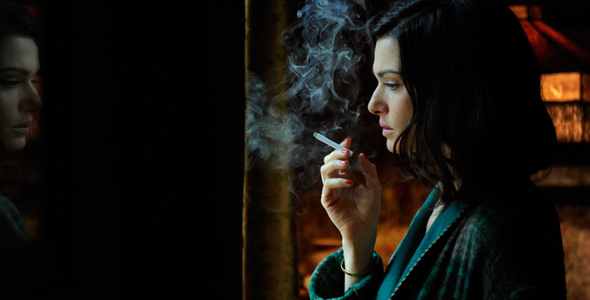Terence Davies’ post-war love affair just lies there
Weisz is Hester, a 40-year-old woman who has left her husband, an eminent, dull lawyer, after finding sexual fulfillment (at least that’s what we’re told; the one sculpted still-life of nudity we’re given is lacking in carnality) with a former RAF pilot. He’s aimless, maybe dissolute; she’s the kind of girlfriend that tries to kill herself if you forget her birthday. It’s not going to work out; it doesn’t work out.
Eminent, dull: it’s no surprise that the most fully realized character in the film (played with restraint by Simon Russell Beale) is the one it most resembles. One standout element is Florian Hoffmeister’s daringly opaque cinematography, which sinks the characters into muted graininess, at times hiding faces, even in standard camera set-ups, in deep shadow. It’s hard to name a recent film that employs a lighting conceit as radical. It might be one of the last salutes to the smoky depth of the film image in the face of the total encroachment of crisp HD.
For all their undeniable earnestness and empathy, Davies’ movies – even his best, most resonant memory pieces like ‘The Long Day Closes’ – are all touched with an air of highbrow condescension. “Only a vulgarian,” Davies seems to say, “could fail to summon the patience my delicate craft requires.” You can almost hear Davies gasping at the exquisiteness of his own images – though perhaps these are just phantom echoes of his own unintentionally campy voice-over in 2008’s ‘Of Time and the City’.
This dainty china-set aesthetic is not up to the task of expressing damaged post-war disillusionment. Davies’ signature retreat into memory, while an audacious choice in his early autobiographical work, here feels like a cop-out. Instead of trudging into the grim rubble of the outside world, he locks himself inside the stuffy attic of his own tastefulness.
Maybe he should’ve taken a cue from mid-century British masters. Michael Powell’s late-wartime ‘I Know Where I’m Going!’ (1945) anticipated the self-protective cynicism of the coming era in Wendy Hiller’s headstrong anti-ingenue, setting her against – and drawing her towards — the anachronistic nobility of Roger Livesey’s Laird.
Powell’s perfect movie has an even more central feature lacking in Davies’ movie: powerful, palpitating chemistry between its leads. Weisz and Hiddleston are too respectful towards each other, and too polite to the characters they’re playing, to really dig down into the bitter tumult of a nastily destructing love affair. The actors’ hampering allegiance to etiquette mirrors that of Davies as director, who settles for insular melodrama.
In Edward Dmytryk’s under-appreciated adaptation of Graham Greene’s masterpiece, ‘The End of the Affair’ (1955), the blitz blasts into the lovers’ secluded haven, irreversibly re-routing their destinies. Davies keeps the blitz, and all those other inconvenient external forces directing human fates, off-screen. When we do get a final glimpse of a bombed-out London street, it’s just a stage-set simulation, an unearned metaphor.
